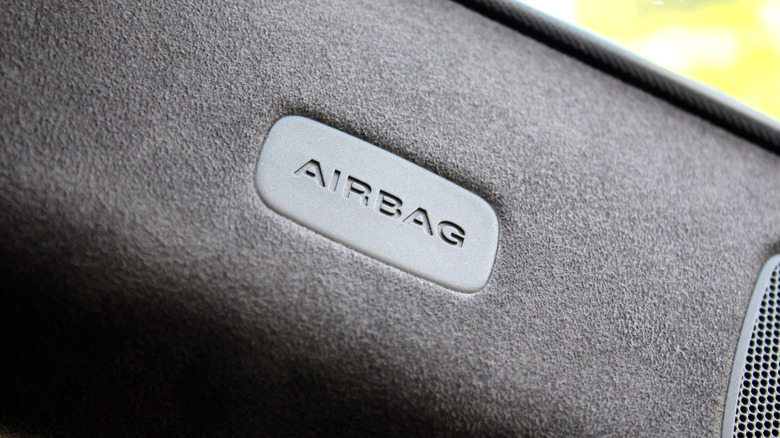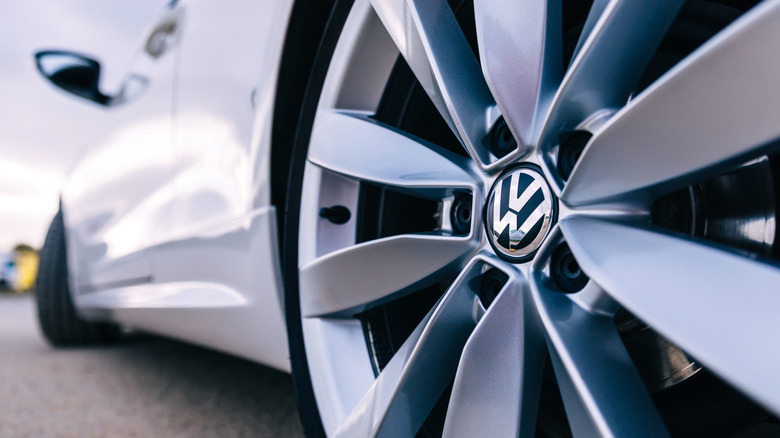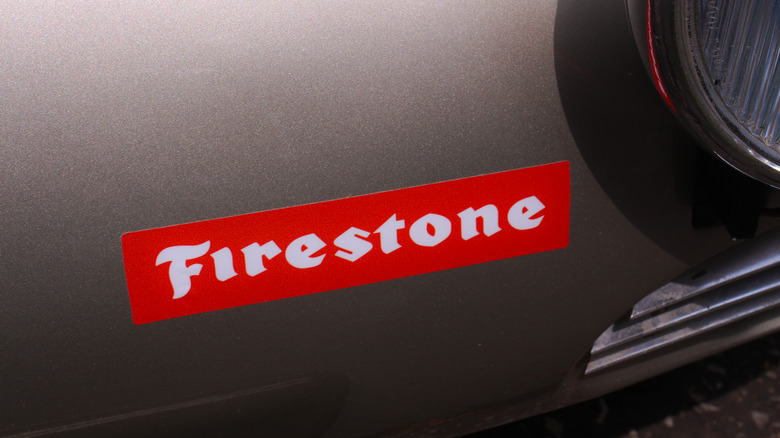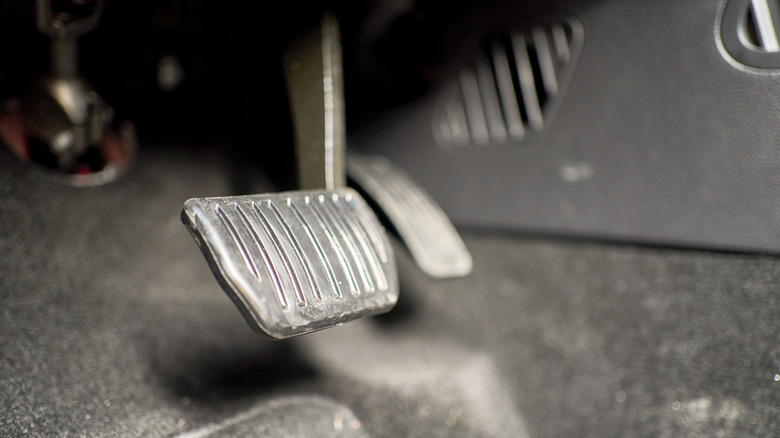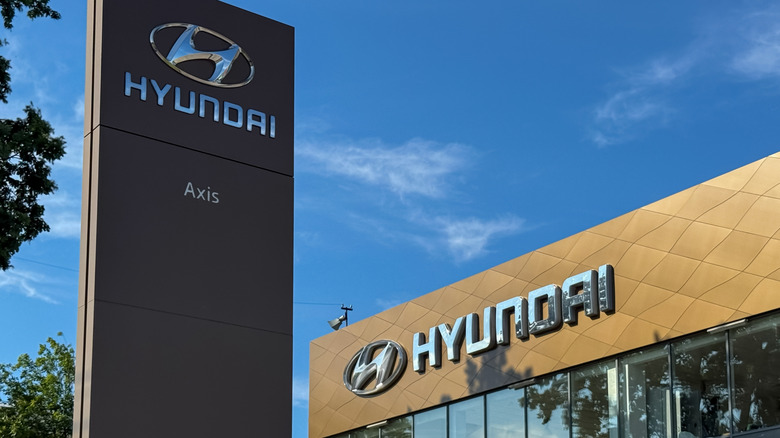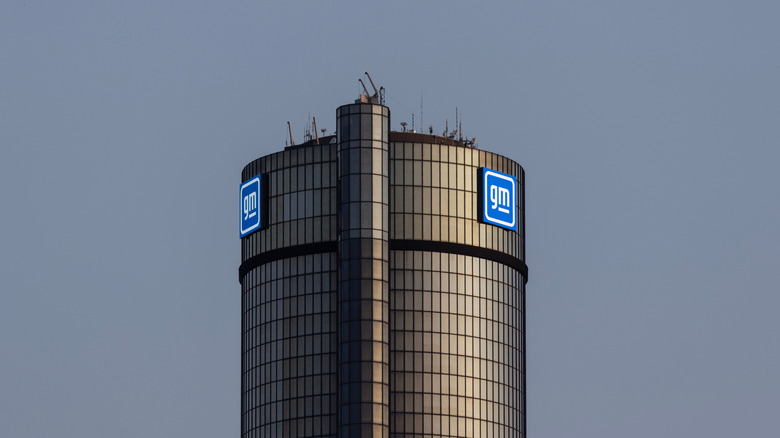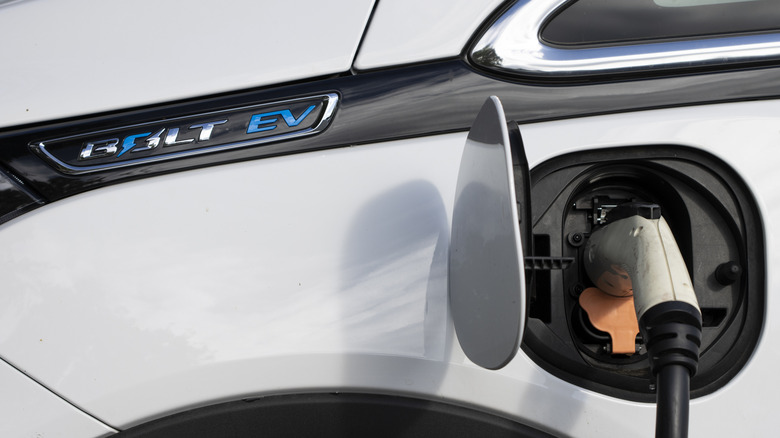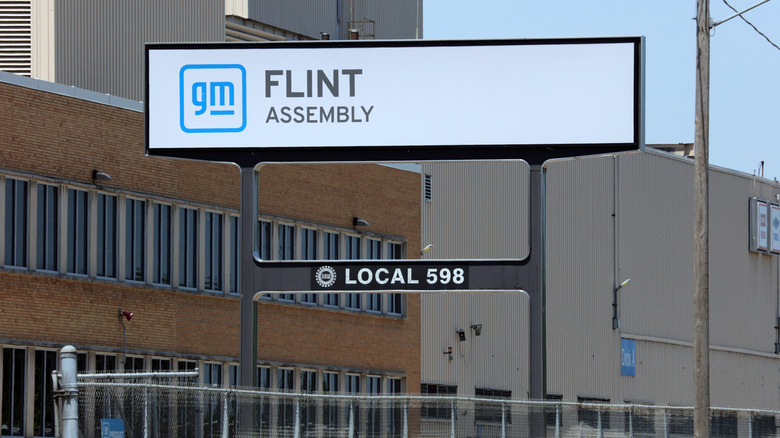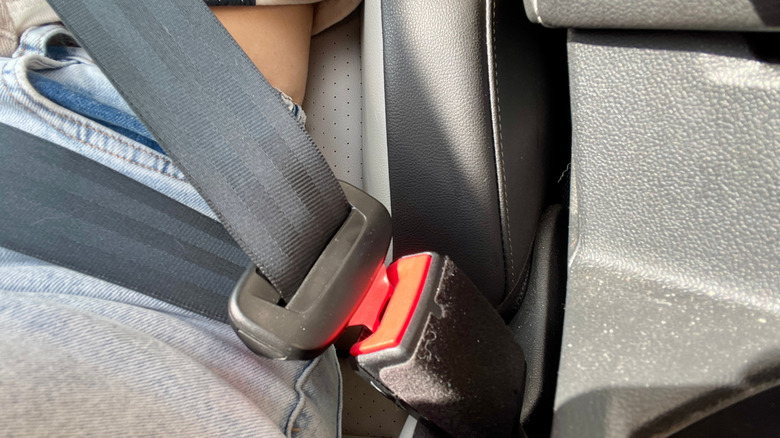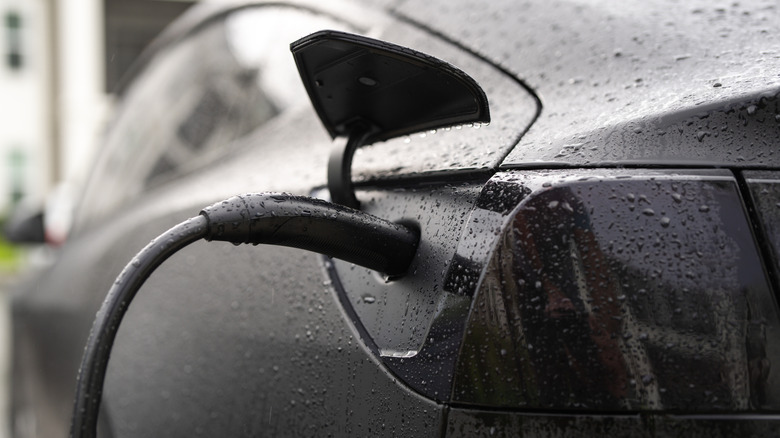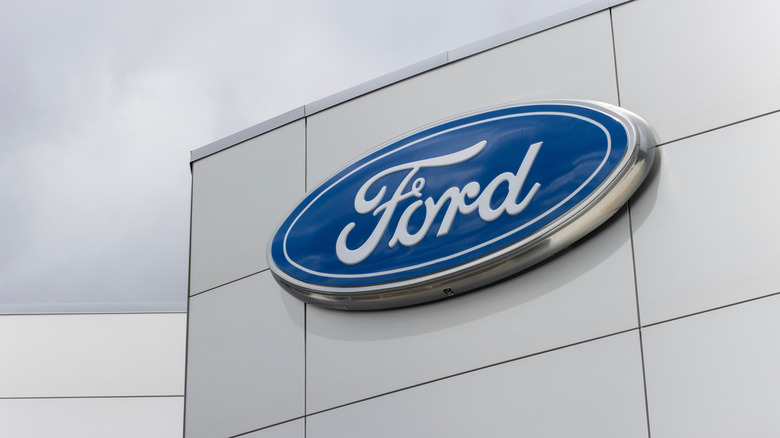The Largest Car Recalls In Recent History Cost A Ton Of Money
The United States is one of the most heavily car-dependent countries on the planet. The 2008 automotive industry crisis, which crashed the "Big Three" domestic car makers — Chrysler, Ford, and General Motors — underscored how central the auto industry's success is to the country's economic health. The largest car recalls in recent history cost many car companies a lot of money, sometimes in the billions of dollars, yet they bore disastrous second-order consequences: avoidable deaths and injuries, broader macroeconomic repercussions, and reputational damages.
Understanding the tightly wound integration of the automotive sector and America's fiscal strength requires a review of some sobering statistics. America leads the world with the most vehicles per capita, excluding microstates and small territories. The U.S. population is more than 342 million, per the Census Bureau, and the country is home to more than 284 million vehicles, according to Statista. Put another way, around 92% of American households have a car. In contrast, slightly over half of the U.S. population has ready access to public transportation, while only a fraction utilizes it.
Car recalls aren't uncommon, especially considering how many vehicles are on the road. ABC reports the U.S. experienced an average of 27 vehicle recalls daily between 2017 and 2022. However, some of these scandals stand out in breadth and expense, both in lives and money. Here are the largest car recalls in recent history that cost a ton of money.
Takata's exploding airbags
Recalls began in 2008 for faulty airbags from the now-shuttered Japanese manufacturer Takata, evolving into what would become the most expensive and widespread vehicle recall in history, both in the U.S. and globally. Tens of millions of vehicles were found to have defective Takata airbags, which showed a tendency to prematurely explode when exposed to high temperatures or moisture, shooting shrapnel at drivers and passengers. The defect has resulted in hundreds of injuries and more than two dozen deaths, according to the National Highway Traffic Safety Administration (NHTSA). The ubiquitous airbags were present in vehicles from the world's largest automakers, including Toyota, Honda, Ford, Dodge, Acura, Pontiac, and Chrysler. Overall, 19 U.S. and foreign-based manufacturers were affected, according to Consumer Reports.
According to the NHTSA, around 67 million airbags were recalled in the U.S. Across the globe, an estimated 100 million vehicles were subject to the recall. The total cost of pulling millions of cars off the road, replacing their airbags, compensating victims, and paying penalties was estimated by Takata to cost a mind-blowing $24 billion, AfterMarketNews reported in 2016. Takata ended up filing for bankruptcy and selling its assets. This became known as the most scandalous, expensive, and notorious vehicular recall in history.
Volkswagen's Dieselgate
Pejoratively referred to as "Dieselgate," what's believed to be the second costliest automotive scandal involved cheating on an environmental test rather than having a deadly malfunction. Originally passed in 1970, the Clean Air Act (CAA) was designed to improve air quality in the U.S. to limit the negative health effects from pollutants and other impurities. In pursuit of this goal, the government implemented specific requirements for diesel engines due to their notoriously harmful emissions. While other car manufacturers designed more environmentally friendly engines, Volkswagen cheated by implementing a "defeat device" — software that flipped on emissions controls exclusively during emissions tests.
In other words, Volkswagen, Porsche, and Audi diesel engines were only in adherence to the law when tested for compliance. The rest of the time they polluted the environment with nitrogen oxides at levels 40 times higher than what was allowed. In 2017, the German manufacturer pleaded guilty to several crimes and agreed to cough up $4.3 billion, split between criminal violations and civil penalties, according to the U.S. Environmental Protection Agency. However, the company acknowledged that the total costs related to the offense were closer to $34 billion, Reuters reported. Nearly 600,000 Volkswagen diesel vehicles were found to have been equipped with this cheating software, although up to 11 million could have been impacted. Although no injuries or deaths were directly linked to this massive vehicle recall, heightened levels of nitrogen oxides in the environment pose a considerable health risk.
Firestone faulty tires
Following the devastating death of a 14-year-old girl involved in a motor vehicle crash due to faulty tires, lawyers requested information that connected the tragedy with a growing list of similar traffic fatalities. Eventually, officials linked at least 46 deaths and hundreds of injuries to defective Firestone tires. It was later revealed that the popular tire brand knew about the problem yet failed to make any necessary changes, resulting in unnecessary loss of life. To make matters worse, Firestone traded accusations with Ford as the automaker's vehicles were disproportionately affected by these malfunctioning tires. More specifically, three-fourths of the official complaints linked to this issue involved Ford Explorers.
Eventually, Firestone was forced to retract over 6.5 million tires. Ford recalled about 13 million tires on its vehicles. The scandal was so deadly and reputationally damaging that it inspired the Transportation Recall Enhancement, Accountability and Documentation Act — a federal law requiring automotive manufacturers to actively report safety issues to the NHTSA. Several waves of recalls were enforced or voluntary for the next few years. In the end, the tire recall cost about $5 billion between the two powerhouse brands, though the overall costs from the faulty tires ended up being much higher. Despite the brand harm, Firestone remains an affordable and reliable tire manufacturer — not one of the three American tire brands that will cost you more money than average.
Toyota's sticky foot pedals
In 2007, the NHTSA began looking into a growing body of reports of unintended acceleration in Toyota vehicles. An increasing number of crashes, resulting in injuries and even deaths, were linked to cars speeding up without the intent of the drivers. Following years of in-depth studies — NASA scientists pitched in to analyze 280,000 lines of software code — federal authorities determined the uncontrolled acceleration was linked to two different issues: poorly designed floor mats that would trap the accelerator and sticky gas pedals that would simply become immovable on their own.
Between these two issues, Toyota ended up recalling more than 10 million vehicles in the U.S. between 2009 and 2010. The first recall involved 3.8 million vehicles affected by the floor mat entrapment. The next rescission focused on 2.3 million vehicles with the sticky accelerator pedal. Following pushback from the government, Toyota recalled another 1.1 million vehicles related to the trapped pedal. More recalls eventually followed. Estimates place the total cost to the manufacturer at $5 billion between the loss of sales, recall costs, federal penalties, and lawsuits. Despite this historic calamity, the Japanese brand maintains a reputation for producing affordable, high-quality vehicles. In fact, one of the most reliable used cars to buy in 2025 is a newer Toyota.
Hyundai/Kia Theta engine
The Theta II was the main engine used in various Hyundai and Kia vehicles, widely known for its reliability and efficiency. Unfortunately, this didn't turn out to be the case for the second iteration of the Theta series of engines. Early on in the engine's release, the four cylinders had problematic crankshafts — the component responsible for transferring the pistons' movement into vehicular motion. The issue released metallic debris into the engine, creating several different problems.
Some drivers experienced knocking noises or stalling, while others suffered oil leaks and damaged engines. In the end, the NHTSA found the Theta II engines were faulty from the get-go, opening up the companies to class action lawsuits and recall requirements that began in 2015. Hyundai and Kia had to take back more than 1.6 million vehicles from the market due to the Theta II engine problems. The companies spent more than $4.5 billion combined related to the recalls, engine replacements, and fines. The whistleblower who highlighted the problem was rewarded $24 million.
General Motors defective engine switch
GM may offer one of the best cars for retirees in terms of affordability and safety, but the still-reputable company isn't without failings in the past. In 2014, the manufacturer pulled 2.6 million cars off the market following years of complaints regarding defective engine switches. As early as 2001, it was noted that some models' ignition switches could be inadvertently turned off, shutting off the engine, slowing down immediately, and deactivating airbags.
According to a Reuters report, GM knew about the issue yet declined to address it. The company determined the ignitions from supplier Delphi Automotive weren't up to snuff but installed them when faced with the overall cost of replacement. Around 124 deaths were linked to the defect, triggering expensive lawsuits and damage claims. Between federal fees and settlement costs, GM's engine switch debacle cost the manufacturer at least $1.4 billion, says CNBC.
Chevy Bolt combustible batteries
Whether an electric car can save you money in the long run isn't even a thought when the vehicle itself doesn't work. This was the case for thousands of drivers of Chevy's highly anticipated Bolt model. The now-discontinued, fully electric model was one of the company's first attempts to enter the burgeoning EV market. Tragically, the automaker failed at making a spark in the industry, unintentionally creating a few fires instead. Chevy Bolt electric batteries were found to be at risk of spontaneously catching fire. Reuters reports that the earliest recorded combustion occurred in 2019. As with many of the largest car recalls, it took some time for Chevy to get ahead of the problem.
Over the years, the manufacturer initiated three separate recalls to cover all 141,000 Chevy Bolts. With the foundational problem concentrated on a single vehicle model, popular opinion changed swiftly. The excitement surrounding a new electric model from Chevy quickly turned into disappointment, anger, and public condemnation, especially as the company reacted slowly. The lethargic response didn't only cost the company in terms of reputation. The automaker spent about $2 billion in costs for the debacle. If you're considering a Chevy, you might want to think twice, as even functional models have expensive maintenance costs.
GM exploding Takata airbags
Initially, General Motors successfully avoided the fallout from the global Takata airbag crisis. The American manufacturer made the case that the inflators used in some of its larger vehicles, such as pickup trucks and SUVs, weren't subject to the same defects as those in average-sized cars. The claim was met with skepticism by regulatory authorities, especially given the far-reaching implications of the Takata airbag issues in the mid-2010s. Still, GM bought a few years' delay by going back and forth with NHTSA before the oversight became too obvious. Between 2016 and 2020, the automaker had sent four different petitions to the government, arguing its airbags were shown to be safe on the road and in tests; federal authorities didn't buy it.
Instead of dragging out the case and incurring more legal costs, GM leaders decided to accept the decision, while maintaining that their vehicles were safe. In 2020, the government demanded that GM recall six million trucks and SUVs, with the company opting to pull seven million across the globe. The struggling U.S.-based manufacturer was projected to spend around $1.2 billion — roughly 33% of its net profits for the year — on the recall. The NHTSA concluded that many of the Takata airbags were subject to the same issues as those in the initial recall.
Multi-brand Takata seat belts
Takata parts are a recurring theme in the story of the largest car recalls in the recent past. To be fair, that omnipresence is more of a reflection of the company's widespread use rather than a systemic fault. One of the older scandals on this list occurred throughout the 1990s when the Transportation Department uncovered malfunctioning Takata seat belts involving about 8.77 million vehicles. The red release button would get stuck easily or completely fail, putting the lives of passengers at immediate risk. The NHTSA reported 63 injuries related to the flawed seat belts, although no deaths were ever recorded.
Several domestic and foreign manufacturers were affected: Honda, Nissan, Mitsubishi, Mazda, Suzuki, Isuzu, Subaru, GM, Chrysler, and Ford. The cost to replace the entire belt fell somewhere between $100 and several hundred dollars, but the total cost of the oversight was estimated to be greater than $1 billion. Keep in mind, these numbers are measured by the dollar's value in the 1990s. In today's dollars, the entire Takata seat belt fiasco dealt a blow of over $2 billion.
Hyundai Kona EV battery fires
Hyundai offers the type of car that upper-class people buy to save money, but not all of the manufacturer's vehicles were a hit. Similar to what happened with the Chevy Bolt battery snafu, Hyundai Kona EV batteries were found to overheat and catch fire at an alarming rate. Following over a dozen reported fires and associated damages, the company issued a recall of 82,000 EV models across the globe in 2021. While impacting significantly fewer vehicles than other mass recalls, the Hyundai EV batteries are exceptionally expensive to replace.
CNN reported that every battery replacement costs around $11,000, a significant chunk of the vehicle's overall price tag. The total expense for the recall was projected to be $900 million. The issue represented another major setback in the EV industry, causing panic among consumers about spontaneous fires and the exorbitant costs of maintaining the batteries.
Ford faulty door latch
Many of the largest car recalls in recent history involve intricate and conspicuously essential parts, such as airbags, seat belts, and ignition switches. However, Ford managed to incur over half a billion dollars in costs due to shoddy door latches. More specifically, doors would fail to function properly as a result of frozen latches or bent cables, leading vehicle doors to appear shut without being locked into place. This often caused the doors to fly open when a vehicle was in motion, putting passengers at serious risk. This issue has been plaguing Ford for years, starting in 2014, forcing over three million cars to be recalled.
According to The New York Times, the cumulative recalls have cost the manufacturer over $640 million. Although the U.S. saw the most recalls, several markets around the world were affected, signaling the company's growing footprint and highlighting the international impact of the issue.
Ford fuel leak
The largest recalls in history aren't all ancient news. Although federal law has cracked down on manufacturers to improve vehicular safety, issues still arise. One of the most recent recall incidents involved Ford SUVs. More specifically, the 2020 to 2022 Escapes and the 2021 to 2024 Broncos were equipped with faulty fuel injectors. Supplied from the Italian-based Dumarey Flowmotion Technologies company, these injectors often cracked, spilling fuel into the vehicle's engine. The potential for fire encouraged Ford to get ahead of the problem and issue recalls so that software updates could be done on affected vehicles. However, the NHTSA confirmed in 2024 that the automaker's remedies were insufficient to solve the issue, requiring further recalls.
In the end, Ford recalled 858,000 SUVs, ranking as one of the largest recalls for the popular brand. The company's proactive approach to the issue, along with its immediate cooperation with federal requests, helped to limit the reputational repercussions. The manufacturer estimated the most recent 2025 recall to cost $570 million, underscoring the financial implications of the oversight.
Ford defective cruise control switch
Between 1996 and 2009, Ford recalled a whopping 16 million vehicles in eight different stages, effectively slow-walking the solution to a widely known problem. The brand damage was significant, especially given the automaker's awareness of the issue. In the mid-1990s, Ford began installing a speed control deactivation switch in a variety of models. More commonly known as a cruise control switch, the mechanism was designed to automatically switch off a vehicle's cruise control following pressure on the brake pedal. Ford installed switches that remained functional even when the car was off. Their positioning near flammable components was found to cause fires.
Across the country, this combustible cruise control switch was attributed to nearly 1,500 fires, according to The New York TImes. Ford was ordered to recall nearly eight million vehicles in 1996, yet the manufacturer continued using identical switches, causing further issues for drivers. By the time the final recall was enacted, the company had taken back 16 million vehicles. Some speculated that the nearly decade-long issue cost Ford $280 million, but that doesn't include legal settlements, damage claims, and other charges. That was an expensive mistake for the automaker, but Ford remains one of the few car brands with vehicles that cost the least over time.

